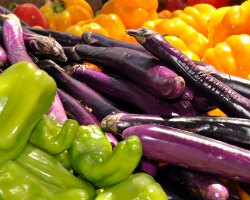
Cholesterol is a frustrating concern for many Americans.
It’s necessary for cell membranes, to produce hormones such as testosterone and estrogen, and for the bile acids that help to digest fat. Cholesterol is also the precursor to vitamin D.
The formidable problem, however, is that too much cholesterol in the bloodstream can lead to a build-up of plaque in the arterial walls increasing the risk heart disease and stroke.
While most of the cholesterol in the body is produced by the liver, it’s also obtained from animal foods, such as butter, eggs, meat, poultry, and dairy products. Plant foods are entirely cholesterol-free, but plants have their own version called plant sterols.
What are Plant Sterols?
Plant sterols, or phytosterols, are natural, fat-like compounds that are structurally similar to cholesterol, yet they are good for the body; in fact, they can effectively and significantly reduce blood cholesterol. Research also shows that phytosterols can boost the immune system and decrease the risk of certain cancers.
About forty-four different plant sterols have been identified, the most abundant being ß-sitosterol, stigmasterol and campesterol. The three are often found together as a concentrate called cholestatin in supplements or added to foods to boost their nutritional value.
Phytosterols are composed of 90 per cent sterols and 10 per cent stanols, which are saturated sterols that don’t have any double bonds in their chemical structure. Like other saturated fats, stanols are more resistant to oxidation, but are as effective as sterols in reducing cholesterol absorption.
Scientists suggest that sterols and stanols lower cholesterol absorption in the small intestine by competing with it, reducing the amount of cholesterol in the blood stream.
Studies show that two to three grams of sterols and stanols a day can reduce LDL (the ‘bad’ cholesterol) by an average of 10 per cent, and combined with a low-fat diet, by 20 per cent or more. Phytosterols have not been shown to have an effect on the levels of HDL cholesterol.
Current research is exploring the effects of plant sterols on cancer. Researchers believe that sterols enter the cell membranes of cancer cells and activate an enzyme called caspase, which causes cell death.
It’s estimated that the average person ingests about 250 mg of sterols a day, more if the diet is mainly plant-based. Vegetarians might consume up to 700 mg.
To achieve the health benefits, most experts recommend a mainly plant-based, low cholesterol diet that includes two or more grams of plant sterols a day.
In the diet, phytosterols are naturally found in vegetable oils, nuts, seeds, whole grains, vegetables and fruit. Vegetables provide between five to forty milligrams of phytosterols. Cooking and processing vegetables reduces the amount of plant sterols; hence, they are best eaten raw.
To help us reach the recommended two daily grams, sterols and stanols are added to various foods, such as buttery spreads, yogurt, juice, various snacks, sauces, and others.
To maximize your intake of phytosterols, aim for a whole foods diet that includes seven to ten (or more) servings of vegetables and fruit daily, use only expeller-pressed, unrefined oils, add raw nuts and seeds wherever you can (for example, on fish, salads, and cereals) and eat them as a snack, and build your meals around wholesome whole grains.
Best Food Sources of Plant Sterols:
Expeller-pressed oils: corn oil, sesame oil, wheat germ oil, flax seed oil, soybean oil, peanut oil, olive oil
Nuts & Seeds: sesame seeds, sunflower seeds, almonds, peanuts, walnuts, cashews, macadamia nuts, peanut butter
Legumes: peas, kidney beans, chick peas, mung beans
Vegetables: green leaf lettuce, Brussels sprouts, okra, asparagus, carrots, beet greens, potatoes, grape leaves, bamboo shoots, cauliflower, onions, tomatoes, cucumber (with peel)
Fruit: orange, figs, apricots, grapefruit, banana, apple, cherries
Spices: ground cloves, ground sage, dried oregano, dried thyme
References:
http://www.hc-sc.gc.ca/fn-an/label-etiquet/claims-reclam/assess-evalu/phytosterols-eng.php




